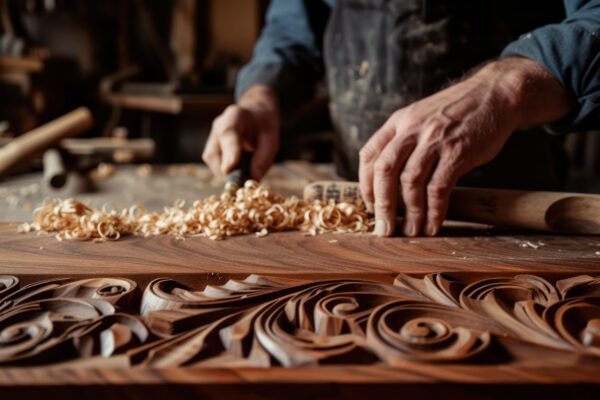In a world dominated by screens, instant gratification, and automation, woodworking stands as a timeless craft that connects us to a simpler, more meaningful way of life. Beyond its practical applications of creating furniture, tools, and art, woodworking offers profound therapeutic and creative benefits. It engages the mind, body, and spirit, fostering a sense of accomplishment, relaxation, and purpose that can be hard to find in the modern hustle. Whether you’re a seasoned artisan or a beginner curious about the craft, woodworking has something unique to offer. Richard Wilk provides an exploration of why woodworking is more than just a hobby—it’s a balm for the soul.
The Therapeutic Power of Working with Wood
- Mindfulness in Motion
At its core, woodworking demands focus and attention to detail. Measuring, cutting, sanding, and assembling require full engagement, pulling you into the present moment. This mindfulness helps to quiet mental noise, much like meditation. The rhythmic motion of sanding or planing wood can be especially calming, creating a meditative flow that clears the mind. - Stress Relief
A study found that crafting activities like woodworking were shown to reduce cortisol levels, the body’s primary stress hormone. The tactile experience of working with wood—feeling its texture, smelling its earthy aroma, and shaping it into something useful or beautiful—provides a sensory escape from daily pressures. - A Tangible Sense of Accomplishment
Unlike many modern tasks that yield digital or intangible results, woodworking leaves you with a finished, physical object. Whether it’s a simple cutting board or a complex cabinet, completing a project instills a sense of pride and fulfillment. The ability to see and touch what you’ve created is a deeply rewarding experience.
Fostering Creativity and Problem-Solving
- Freedom of Expression
Woodworking allows for endless creative expression. The grain, color, and texture of different woods open up opportunities to design unique pieces. Whether you’re carving intricate details or assembling minimalist furniture, every project reflects your personal style and vision. - Encourages Patience and Precision
Woodworking teaches the value of patience. Rushing through a project often leads to mistakes, while careful planning and execution lead to satisfying results. The process also enhances problem-solving skills, as unexpected challenges like misaligned cuts or grain patterns often require inventive solutions. - Blending Art and Function
Woodworking is where art meets utility. Crafting something that is not only beautiful but also functional—like a handcrafted table or a bespoke jewelry box—adds a layer of purpose to creativity. This duality enriches the sense of achievement and encourages thoughtful design.
Physical Benefits of Woodworking
- A Hands-On Workout
While woodworking might not replace a trip to the gym, it certainly engages your body. Sawing, hammering, and planing involve physical effort, building hand-eye coordination and fine motor skills. Larger projects, such as building furniture, often require lifting and maneuvering, providing a moderate workout. - Improved Dexterity
Working with tools sharpens fine motor skills, especially as you practice intricate cuts, carvings, or joinery. This can be particularly beneficial for older adults, helping maintain coordination and prevent stiffness in the hands and fingers. - Reducing Screen Time
With so much of modern life spent in front of computers and phones, woodworking provides a welcome break. It encourages movement, creativity, and engagement with the physical world, helping to balance the effects of prolonged screen time.
Connecting to Tradition and Nature
- Rooted in History
Woodworking has been practiced for millennia, connecting us to a long lineage of artisans and builders. When you craft with wood, you’re participating in a tradition that spans cultures and centuries, adding a sense of timelessness to your work. - Sustainability and Stewardship
Choosing woodworking as a hobby fosters a deeper appreciation for natural resources. Many woodworkers prioritize using sustainably sourced materials and repurposing wood, which helps reduce waste and environmental impact. Crafting your own items also reduces reliance on mass-produced goods, promoting a more sustainable lifestyle. - A Connection to Nature
Wood is a natural, living material that changes and evolves with time. Its grains, knots, and imperfections tell a story, and working with it fosters a sense of respect for nature. This connection can be grounding and deeply satisfying, especially in an increasingly urbanized world.
Building Community Through Craft
- Sharing Skills and Knowledge
Woodworking communities thrive on sharing techniques, tips, and inspiration. Whether through local workshops, online forums, or woodworking clubs, the craft fosters camaraderie and mutual support. Learning from others and sharing your own experiences builds connections that extend beyond the workshop. - Creating Heirlooms and Gifts
Handcrafted items have sentimental value. A handmade wooden toy, cutting board, or rocking chair becomes more than just an object—it becomes a cherished heirloom. Gifting something you’ve created adds a personal touch that’s deeply meaningful to the recipient.
Getting Started with Woodworking
Starting a woodworking journey doesn’t require a fully equipped workshop or advanced skills. Basic tools like a saw, chisel, hammer, and sandpaper are enough for simple projects. Beginners can start with small items like birdhouses or picture frames before progressing to larger, more complex creations.
Many resources, including online tutorials, books, and local classes, are available to help you learn the craft. As your skills grow, so will your ability to tackle ambitious projects and experiment with new techniques.
Woodworking is more than a hobby—it’s a pathway to self-discovery, mindfulness, and connection. By engaging the mind, body, and soul, it offers a fulfilling escape from the chaos of daily life while teaching patience, creativity, and resilience.
Whether you take it up as a weekend pastime or a lifelong passion, woodworking can transform not only the wood in your hands but also the spirit within. So pick up that chisel, embrace the grain, and start crafting your way to a more grounded and inspired life.
